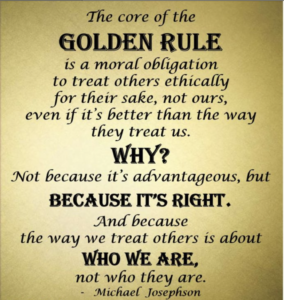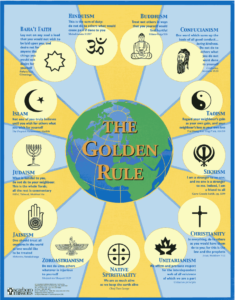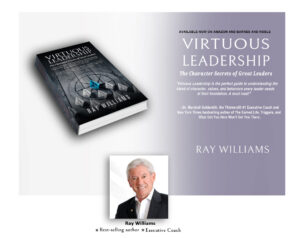There is a crisis of confidence in business leadership and with it calls for leadership of virtuous character and high ethical behavior.
Ethical scandals, corruption and organizational mistreatment have been widely reported. Financial problems have produced a worldwide economic recession and corporate lay-offs. The issues facing contemporary organizational leaders are complex – and in a globally connected economy, there are few simple solutions.
Today’s leaders have to deal with growing demands for greater corporate social responsibility, rather than focusing exclusively on shareholder returns. So they need skills that go beyond analytical problem-solving, raising questions about how well management education prepares future business leaders for the ethical and social challenges that await them.
Demands for socially responsible leadership are growing public demand that corporations and corporate leaders serve society as a whole is increasing. Community responsiveness is becoming more important in leader behavior because of:
- an increasing emphasis on societal well-being and quality of life;
- pressures from special interest groups and non-governmental organizations on the corporate agenda;
- a move away from short-term profit maximization towards an emphasis on the triple bottom line: people, planet and profits; and strategic management of corporate social performance, disclosing social responsibility practices.
Some executive MBA programs and large corporations already include spirituality, emotional intelligence, self-awareness and reflection in their leadership development programs. For business schools, the current turbulent business and social environment offers an exceptional opportunity to rethink their approach and redesign the curriculum to support responsible management education.
There have been calls encouraging decision-makers to choose and promote virtuous leaders of good character, and demand current leaders lead from a place of ethical conduct and integrity. Some have even suggested incorporating the “Golden Rule” into business can be part of the solution.

The “Golden Rule” in History
We can find several interesting and motivating variations on the Golden Rule in literature from ancient Egypt (c. 2000 BCE): “Is your lord hateful? Do not do to somebody what you would not want to be done to you.”
Confucius’ (500 BCE) ethical principle of reciprocity is well-known in Chinese tradition: Is there a single phrase that can be followed as a practical guide for one’s entire life? Isn’t RECIPROCITY such a term, the Master asked. Don’t do to others what you wouldn’t want to be done to you.”
The ethical endeavour of man, which is performed through upholding the dharma, is mentioned by the ancient Hindu philosopher Brihaspati (850-650 BCE): “One should never do anything to another which one sees as hurtful to one’s self. This is the moral code (dharma), to put it briefly.
The ancient Persians were familiar with several variations of this moral rule, which they believed to be a manifestation of the naturalness of the world: “That nature alone is good which refrains from doing to another whatever is not good for itself,” and similarly, “Whatever is disagreeable to you, do unto others.”
Muhammad (570–632 CE), who lived in public, was critical of the ethical principle of blood retribution, which was prevalent during the period. Muhammad preferred the maxim “don’t hurt anyone so that nobody hurts you” because he wanted to keep the harmony and stability of the tribe and community.
Buddha (623-543 BCE) based on the central tenet of Buddhism, “They are just like I am, I am just like they are,” in creating his various ethical standards. “All quake at violence; all value life. Putting oneself in the position of another, one should refrain from killing or inciting others to kill, or “One who, while seeking happiness for himself, oppresses other creatures who also seek pleasure with violence, will not get happiness in the afterlife.” One will achieve happiness in the afterlife if one pursues happiness without violently oppressing those who share that goal.
Generally speaking, it is thought that the Judeo-Christian conception of ethics is based on the idea of love because Jesus Christ developed his teaching on interpersonal interactions using the well-known formula of love. The requirement of love is universal and, shockingly, extends to people who act hostilely. Numerous influential intellectuals, politicians, and opinion leaders have been influenced by this need. The most well-known examples of people who practised and preached the ethics of love as a non-violent way of life were Leo Tolstoy, Mahatma Gandhi, Mother Teresa, Father Damien, and Albert Schweitzer.

The Humanistic Perspective
The moral principle known as the Golden Rule has analogues in psychology, economics, environmental sciences, and legal systems. The fundamental ethical axis of humanist thinking is the challenge to treat others as we would like to be treated by them. The moral requirement of the educated, forward-thinking, and inclusively rooted man of the 21st century has thus, of course, been to put oneself in the place of others, to respect the value and coordinates of others, to tolerate the cultural context of others, etc. In general, the Golden Rule is a principle that almost all religions share. But not one of these interpretations of the Golden Rule calls for a deity.
According to some academics, the Golden Rule can help create a humanist society based on respect and compassion: Moral rules do not have to be difficult or cryptic to be valuable; in fact, the greatness of this rule lies exactly in its clarity. A robust and healthy moral system is easy to formulate, simple to comprehend, and simple to implement. These three characteristics are its defining characteristics. Its underlying principle is simple to understand: before doing something that can hurt someone else, try to put yourself in their shoes and ask yourself if you would want to be the one who received it. You shouldn’t do it because if you wouldn’t want to be in that situation, neither would the other person. This is made possible by the fundamental human characteristic of empathy, the capacity to feel what another is feeling virtual. Empathy is also the guiding concept by which we should spend our lives.
The Golden Rule in Business and Leadership
The focus on corporate ethics in society and business over the past ten years has led to one inescapable conclusion: managers at all levels require assistance when making moral decisions at work. The central role of decision-making in management has long been recognized. Managers face several decisions in the course of their daily work that involves issues of right and wrong, justice, fairness, or, in the words of some business ethicists, the distribution of benefits and damages.
There are numerous workplace challenges where ethical concerns are now taking centre stage. In a recent poll for The Conference Board, Ronald Berenbeim highlighted seven main concerns that at least 80% of his 300 respondents believed were ethical problems in business today. These seven problems were sexual harassment, improper payments, employee privacy, employee conflicts of interest, inappropriate presents to business personnel, affirmative action, and environmental concerns.
According to W. Patrick Cunningham’s article in the Journal of Business Ethics, “This “Golden Rule” is frequently applied in business to judge the morality of a suggested course of action. Take the frequently dramatized and studied subject of supervisors dating subordinates, for instance. A manager might not think it is improper to offer romance to an attractive employee if his ethical judgement is clouded by enthusiasm for that person. However, if the employer were to imagine that the roles were reversed, he would realize that the proposal puts the employee in a precarious and exploited situation, regardless of whether the romantic attraction is shared. The Golden Rule would forbid acting out the attraction because it is a circumstance that no manager would want to be put in.”
The self-interested desire that drives the competitive business principle does not adequately provide for social well-being. However, a businessperson can demonstrate his adherence to the principles and spirit of the golden rule by focusing all of his efforts on ensuring that his company performs economically as it should. In doing so, he will understand that achieving economic goals necessitates consideration of the social dimensions of business operations, including others’ well-being.
In their work for the Journal of Business Ethics, Brian K. Burton and Michael Goldsby state: “The phenomena of globalization of markets has been accompanied by proposals for the globalization of ethical norms. The so-called Golden Rule is one idea that is frequently mentioned in these conversations. In business literature, the maxim is frequently referred to as ‘Do unto others as you would have others do unto you.’ However, people who apply it frequently do so without fully understanding the rule and what it stands for.”
There is no doubt that many nations have diverse moral traditions; this is true not just of the subtle and not-so-subtle differences seen among all societies, but also of the East-West divide in values that are frequently discussed superficially. Even with this in mind, however, it has been recognized that international commerce requires a strong and enduring ethical foundation. T. Donaldson highlighted the need for general guidelines for making decisions in a framework based on moral principles of rights in one of the first studies on international business ethics, The Ethics of International Business. Writing in the Journal of Business Ethics, D.C. Payne et al. observe the extreme disparity in laws and morals between nations, claiming that the need for a global code to address these disparities is “paramount.” H. Kung makes it abundantly evident in the publication Business Ethics Quarterly that “It is obvious that there must be a globalization in ethics from the mere fact of economic globalization. How can a world with conflicting ethical standards and laws become fair and peaceful?” Since he thinks that market globalization is inevitable, it is also necessary to experience moral globalization.
If such a call differs in any way from the norm in moral theory, that raises a concern about the globalization of morals in business ethics. The majority of ethical systems assert their universal applicability. These presentations assume that, despite their outward differences, people from all cultures share certain fundamental traits that can be considered to define human nature. Similar to this, proponents of the globalization of morals frequently mention the variety of worldviews and fundamental ideas put forward by some organizations.
As a starting point, T. Donaldson, for instance, provides a list of the ten most important international human rights. In 1948, the United Nations adopted the Universal Declaration of Human Rights, which made another attempt to uphold human rights. The International Chamber of Commerce, the International Labor Organization, the Organization for Economic Cooperation and Development, and the Center for Transnational Corporations all have standards of conduct that Payne et al. mention. Kung discusses the values outlined by the InterAction Council, the Parliament of the World’s Religions, the Caux Round Table, the World Commission on Culture and Development, the International Commission on Global Governance, and the Interfaith Declaration on a code of ethics for international business.
Any attempt to advance a global ethic faces the fundamental challenge that, despite the best efforts of human history’s greatest brains, no such ethic has ever been universally recognized. The appeal to underlying principles is an attempt to address this challenge.
Can the Golden Rule be a Universal Moral Principle for Business?
Some businesses have come under fire for explicitly using the Golden Rule as a moral code. After learning what it meant from his father, James C. Penney, the founder of J. C. Penney Co. Inc., applied the rule as a moral tenet in his dry goods firm. Penney inaugurated the Golden Rule Store in 1902. The Lincoln brothers, John and James, formed Lincoln Electric, which is known for its famed Incentive Management system, which rewards employees for performance. The Lincoln brothers also made a lifelong commitment to their employees and placed a strong emphasis on communicating with them.
The Golden Rule is frequently seen as a duty to treat people with fairness and respect (and animals as well). The market is a system made up of people with whom the person conducting business has relationships and where reliability and decency are crucial. Therefore, it should come as no surprise that the authors of the popular and scholarly business literature mentioned above have cited the rule as a standard for managing behaviour.
The advantages of applying the Golden Rule in business were outlined by Ken Gosnell in a Forbes article: It prioritizes building relationships first; can produce a consistent experience;,= and can motivate individuals and organizations to work more.
In his book There’s No Such Thing as ‘Business’ Ethics: There’s Only One Rule for Making Decisions, management and leadership guru John C. Maxwell makes the case that the Golden Rule ought to be the guiding ethical concept for executives to operate their firms.
Final Thoughts
The prevalence of corrupt and self-interested leaders in today’s world often creates serious ethical problems, which end up harming people and the planet.
Despite some of the drawbacks and inconsistencies implicit in developing a universal ethical principle on which businesses can operate, the Golden Rule provides a good checkpoint and guide for businesses to ensure that human and planetary dignity and a reduction of harm can be beneficial.
You can read more about the importance of ethical behavior in my new book, Virtuous Leadership: The Character Secrets of Great Leaders.


